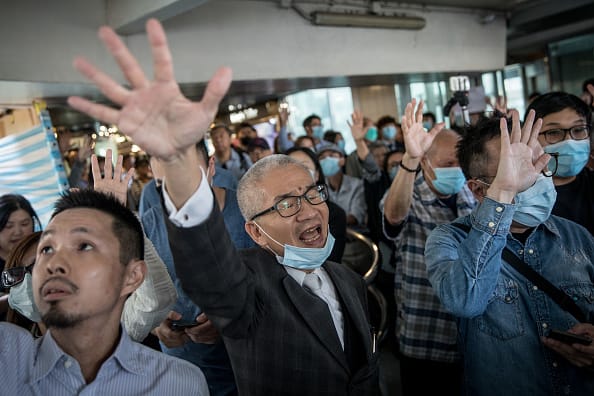
Stocks in Asia were lower in Friday morning trade as investors continue to watch for developments on U.S.-China trade following a recent escalation in tensions over Hong Kong.
Hong Kong’s Hang Seng index led losses among major markets regionally as it fell 1.54% in early trade, with shares of Chinese tech giant Tencent dropping 1.6%.
Mainland Chinese stocks slipped in early trade, with the Shanghai composite down about 0.3% and Shenzhen composite declining 0.232%. The Shenzhen component also shed 0.28%.
Elsewhere, Japan’s Nikkei 225 and Topix index both shed earlier gains to trade largely flat.
South Korea’s Kospi slipped 0.86% as shares of industry heavyweight Samsung Electronics fell 1.75%. The Bank of Korea announced on Friday its decision to keep the benchmark interest rate steady at 1.25%, in line with expectations of economists in a Reuters poll.
Meanwhile, shares in Australia edged higher, with the S&P/ASX 200 seeing fractional gains.
Overall, the MSCI Asia ex-Japan index traded 0.61% lower.
Following the signing of bills by U.S. President Donald Trump in support of Hong Kong protesters on Wednesday, investors continue to assess the potential impact on ongoing trade negotiations between Washington and Beijing. China strongly condemned the actions of the U.S., with the country’s Ministry of Foreign Affairs saying Thursday that Washington had “sinister intentions.”
Hong Kong has been rocked by months of civil unrest initially sparked by a since-withdrawn extradition bill.
That comes as an anticipated “phase one” trade deal between the U.S. and China remains elusive ahead of Dec. 15, when additional tariffs on Chinese exports to the U.S. are set to go into effect.
“We’re still concerned (about) what is the impact of this Hong Kong bill … on the trade front,” Suan Teck Kin, head of research at United Overseas Bank, told CNBC’s “Squawk Box” on Friday.
The Japanese yen, often seen as a safe-haven currency in times of market uncertainty, changed hands at 109.48 against the dollar after trading in a range between 109.4 and 109.5 for much of yesterday.
“A larger decline in USD/JPY is a material risk once we get a formal reaction by the Chinese authorities to the US Hong Kong Bill,” Kim Mundy, a currency strategist at Commonwealth Bank of Australia, wrote in a note.
“US-China trade developments and movements in US Treasury yields will remain the key drivers of JPY direction, with Japanese economic developments a secondary driver,” Mundy said.
The U.S. dollar index, which tracks the greenback against a basket of its peers, was last at 98.317 after earlier touching lows below 98.3.
The Australian dollar was at $0.6766 after touching lows around $0.676 yesterday.
Oil prices declined in the morning of Asian trading hours, with international benchmark Brent crude futures slipping 0.11% to $63.80 per barrel. U.S. crude futures were fractionally lower at $58.08 per barrel.
What’s on tap:
- Taiwan: Revised GDP for the third quarter at 4:00 p.m. HK/SIN
- India: Third quarter GDP at 8:00 p.m. HK/SIN

